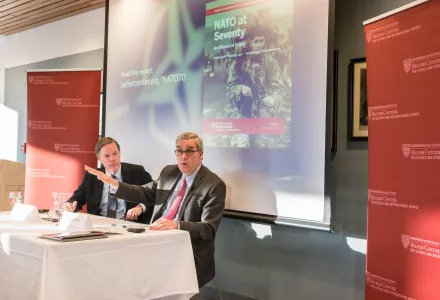
As the 70th anniversary of the North Atlantic Treaty Organization (NATO) approaches in early April, the world’s oldest and most successful military alliance of democratic nations faces serious and complex challenges to its purpose, effectiveness, and unity.
In a Belfer Center report released at the Munich Security Conference in February, based on six months of extensive discussions with European and North American leaders, former U.S. Ambassadors to NATO Douglas Lute and Nicholas Burns underscore 10 major challenges and offer recommendations to bolster this critically important alliance. Published days after it was learned that President Trump had considered unilaterally withdrawing from NATO, the report was widely discussed among European and U.S. Congressional leadership gathered in Munich and found broad resonance in the international press. At the conference, Burns addressed the report’s findings in conversation with former U.S. Vice President Joe Biden in a mainstage event. The authors also discussed their conclusions with the NATO Deputy Secretary General Rose Gottemoeller in a Town Hall discussion at the Security Conference.
“NATO is facing one of its most difficult crises in seven decades,” said Burns, Harvard Kennedy School professor and Faculty Chair of the Project on Europe and the Transatlantic Relationship. “While NATO has strategic challenges to meet, the single greatest threat is the absence of strong, principled American presidential leadership for the first time in its history.”
Biden agreed the Trump administration had needlessly weakened U.S. ties to Europe.
Lute, now a non-resident Senior Fellow with the Europe Project, said, “Our goal with this report is to prompt attention to tough, strategic challenges and deep introspection among the allies. NATO should move revitalized and retooled into the decades ahead, and again demonstrate its ability to adapt.”
Restoring U.S. leadership within NATO is paramount, Burns and Lute argue in the report, recommending that Congress act to protect NATO by passing legislation this year, requiring Congressional approval should President Trump attempt to alter U.S. treaty commitments to NATO allies or seek to take the U.S. out of the Alliance altogether. They also offer recommendations on how NATO should address low European defense spending and anti-democratic governments within the organization, which are a “cancer” on the Alliance, Burns and Lute said.
They make practical recommendations on how to contain Russian aggression in Ukraine and beyond, and how to emerge from the war in Afghanistan. They also highlight NATO’s strengths in competing with the expanding international agenda of China. While they recommend keeping the door open to new NATO members, Burns and Lute emphasize the necessity of internal reforms, including a stronger role for the NATO Secretary General.
Read the full report here.
Clüver Ashbrook, Cathryn. "Blueprints for Tackling 2019 Challenges: NATO in Crisis." Belfer Center Newsletter. Belfer Center for Science and International Affairs, Harvard Kennedy School (Spring 2019).




